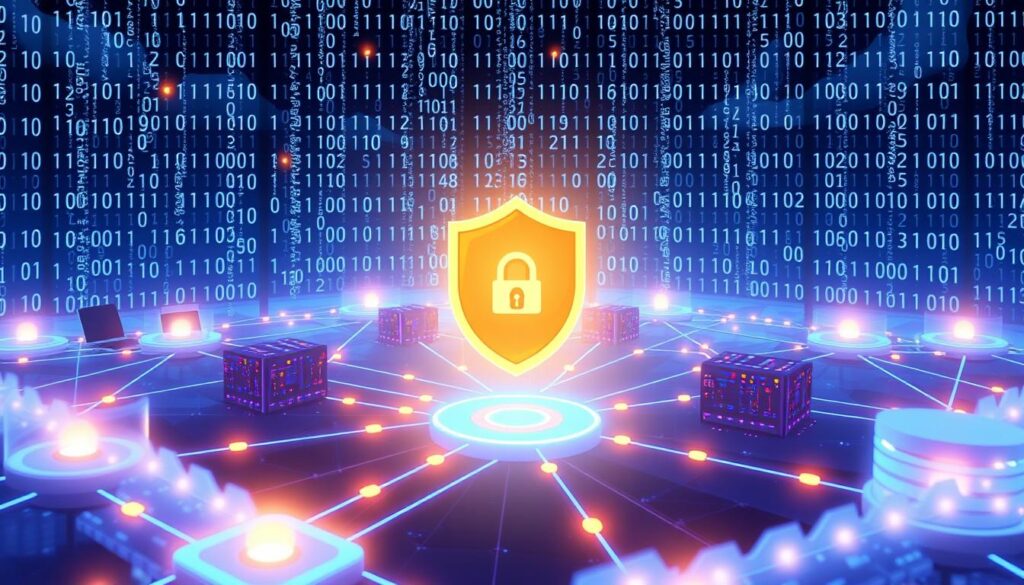In today’s digital world, cybersecurity is more important than ever. The global average cost of a data breach hit over $4 million in 2023. This shows a clear increase over the last three years1. Ensuring cybersecurity availability is key for businesses to keep running smoothly.
Ensuring cybersecurity availability is vital for all parts of a business. This includes data storage and network security. It’s important to have strong security to keep information safe2. With limited resources, not all data can be fully protected. So, teamwork and clear communication are essential for cybersecurity teams2.
Data breaches can cause big problems, hitting small businesses hard. They can lose a lot of productivity and profit1.
Key Takeaways
- Availability is a critical aspect of cybersecurity that impacts business operations and productivity.
- Ensuring cybersecurity availability is essential to protect sensitive information and prevent data breaches.
- Why availability matters in cybersecurity is a question that organizations must answer to prioritize their cybersecurity measures.
- Cybersecurity policies and procedures are vital in keeping systems running and avoiding failures.
- Setting clear boundaries and respectful communication is key for staying focused during long technical tasks.
- Understanding the importance of cybersecurity availability helps organizations make better cybersecurity choices.
Understanding the Core Concept of Availability in Cybersecurity
Availability in cybersecurity means users can get to sensitive info when they need it. It’s key to keeping systems and data safe. Cyberattacks can cost a lot, hurt customer trust, and make recovery hard. So, strong cybersecurity is vital to protect against these issues3.
The CIA triad includes confidentiality, integrity, and availability. These three are vital for keeping info safe and private4. System availability depends on hardware, software, and network setup. Keeping these in good shape helps avoid crashes and keeps the internet running3.
Defining Availability in the Context of Information Security
Availability means info is always there for those who should see it. It’s about keeping hardware and tech in top shape4. Using things like RAID and high availability clusters helps. Also, having quick disaster recovery plans is key for unexpected problems like power outages4.
The CIA Triad: Where Availability Fits In
The CIA triad is all about keeping info safe. It has confidentiality, integrity, and availability4. Data integrity is managed with version control and encryption. Availability is about making sure info is there when you need it. It’s essential for keeping systems running smoothly4.
Key Components of System Availability
To keep systems available, focus on these areas:
- Hardware infrastructure
- Software infrastructure
- Network infrastructure
- Processes and procedures for uptime
By tackling these, you can boost your cybersecurity. This helps keep systems and data safe and running well34.
Why Availability Matters in Cybersecurity: Impact on Business Operations
Ensuring availability in cybersecurity measures is key for businesses. It affects their operations and profits. In 2023, a data breach cost the average organization $4.45 million5. This shows why strong cybersecurity availability strategies are vital to avoid such losses.
Understanding risks and consequences of cyberattacks is important. For example, 36% of companies in PwC’s survey faced a data breach costing over $1 million in three years5. Also, ransomware attacks saw an average ransom payment of $1.54 million in early 2023, up from $812,380 in 20225.
To fight these risks, businesses can act early. They should use multifactor authentication and be careful with public Wi-Fi, as cybersecurity experts suggest. By focusing on availability in cybersecurity measures and using good cybersecurity availability strategies, companies can lower downtime and data breach risks. This helps enhance cybersecurity availability and keeps operations safe.
| Type of Attack | Average Cost |
|---|---|
| Data Breach | $4.45 million |
| Ransomware Attack | $1.54 million |
By grasping the value of availability in cybersecurity measures and acting proactively, businesses can safeguard their operations. This reduces the chance of cyberattacks6.
Common Threats to System Availability
System availability is key in cybersecurity. Knowing the common threats is vital for keeping systems safe. DDoS attacks can lead to a 30% revenue loss for businesses with long service outages7. Phishing attempts are also a big threat, causing about 90% of successful data breaches7.
Other dangers include hardware failures, natural disasters, and human mistakes. Insider threats are also a big worry, with about 60% of data breaches caused by insiders7. It’s clear why availability is so important in cybersecurity. It keeps businesses running smoothly and protects important data. By knowing these threats, companies can take steps to prevent them, like using redundancy and disaster recovery plans.
Here are some common threats to system availability:
- DDoS attacks
- Phishing attempts
- Hardware failures
- Natural disasters
- Human error
- Insider threats
These threats show how important a strong availability strategy is. It must ensure cybersecurity and protect against these threats8.
Building a Robust Availability Strategy
To ensure cybersecurity availability benefits, businesses must focus on cyber resilience and availability. They need to use cybersecurity availability strategies to fight off threats and cut down on downtime. In 2022, the U.S. saw 480,000 cyberattacks9, showing the importance of strong security.
Companies can lower risks by managing cybersecurity risks9. This means spotting threats, figuring out their chances and effects, and using controls to lessen them. By focusing on availability, businesses can keep their systems and data open, cutting down on downtime and data loss. Key steps for a strong availability strategy include:
- Setting up regular backups to keep data safe and current9
- Doing security checks often to find weak spots10
- Teaching employees about cybersecurity to lower the chance of mistakes10
By being proactive in cybersecurity and focusing on availability, businesses can lower cyber attack risks. With cyber attacks on the rise, having a solid availability strategy is critical.

Implementing High-Availability Solutions
High-availability solutions are key to keeping systems and data safe. They include strategies like redundancy, load balancing, and disaster recovery planning. These steps help businesses stay secure and avoid security issues.
Redundancy and failover systems are vital for high availability. Using an N+1 model ensures systems keep working even with one server down11. Load balancing also helps keep systems running smoothly, even during outages or breaches.
Having a disaster recovery plan is also critical. It helps systems and data recover quickly after a disaster. This makes businesses more resilient and less likely to lose money due to downtime12.
Metrics like Mean Time Between Failures (MTBF) and Mean Downtime (MDT) help measure availability11. By tracking these, businesses can find ways to improve. High availability can also be achieved through active/standby components, ensuring systems keep running12.
Issues like disk failures or network overloads can affect availability13. To prevent this, businesses can use redundant connections and anti-DDoS routers. By focusing on availability, businesses can keep their operations running smoothly and protect their data.
For more on high availability, check out Imperva. They explain why high availability is so important in cybersecurity. Understanding these concepts helps businesses stay secure and avoid security problems.
| Availability Percentage | Expected Downtime |
|---|---|
| 99.999% | 5 minutes and 15.6 seconds per year |
| 99.9% | 8 hours and 45 minutes per year |
| 99% | 3 days per year |
Conclusion: Ensuring Long-term System Availability and Resilience
Keeping systems available and resilient is key for businesses to stay safe from cyber threats. By focusing on cybersecurity availability importance, companies can strengthen their defenses. This is vital in today’s world, where cybersecurity efforts are often hindered by conflicting goals14.
Many businesses wonder why availability is so important in cybersecurity. The answer is simple: it’s a vital part of keeping systems safe and running smoothly. By following the advice in this article, companies can make sure their systems and data are always ready. This reduces the chance of security problems and boosts resilience. In fact, 93% of organizations say backups are key to staying resilient15, and 70% of cybersecurity leaders believe real-time threat visibility is essential for quick response15.
In summary, ensuring long-term system availability and resilience needs a thorough plan. This plan should focus on the importance of cybersecurity availability. By doing this, businesses can stay ahead, build trust with customers, and lower security risks. This can be done by setting up strong availability strategies, testing disaster recovery plans often, and using different Internet Service Providers to keep operations running smoothly15.
FAQ
What is the importance of availability in cybersecurity?
How does availability impact business operations?
What are the key components of system availability?
What are the common threats to system availability?
How can businesses build a robust availability strategy?
What are some high-availability solutions that businesses can implement?
Why is it essential to ensure long-term system availability and resilience?
Source Links
- 5 Principles of Information Assurance – Sentient Digital, Inc. – https://sdi.ai/blog/5-principles-of-information-assurance/
- Five types of better boundaries in cyber security to sustain well-being – https://www.linkedin.com/pulse/five-types-better-boundaries-cyber-security-sustain-alvin-rubyono-4pkkc
- What’s The CIA Triad? Confidentiality, Integrity, & Availability, Explained | Splunk – https://www.splunk.com/en_us/blog/learn/cia-triad-confidentiality-integrity-availability.html
- What is the CIA Triad? | Definition from TechTarget – https://www.techtarget.com/whatis/definition/Confidentiality-integrity-and-availability-CIA
- Why Effective Cybersecurity is Important for Businesses – https://www.techtarget.com/searchsecurity/feature/Why-effective-cybersecurity-is-important-for-businesses
- Cyber risk and cybersecurity: a systematic review of data availability – https://pmc.ncbi.nlm.nih.gov/articles/PMC8853293/
- Cybersecurity Threats: What They Are & How They Work Today | Splunk – https://www.splunk.com/en_us/blog/learn/cybersecurity-threats.html
- Top 5 cybersecurity threats legal teams face today – https://legal.thomsonreuters.com/en/insights/articles/top-5-most-common-cyber-security-threats-today
- Building a great cybersecurity strategy: Expert tips – https://fieldeffect.com/blog/building-a-great-cybersecurity-strategy-expert-tips
- How to Build a Robust Cybersecurity Strategy for Your Business – KiwiTech – https://www.kiwitech.com/blog/how-to-build-a-robust-cybersecurity-strategy-for-your-business/
- Beyond Redundancy. Understanding, Implementing, and Optimizing High Availability in IT Systems – zenarmor.com – https://www.zenarmor.com/docs/network-security-tutorials/what-is-high-availability
- 4 Reasons Why: The Importance of High Availability in OT Network Perimeter Cybersecurity – OPSWAT – https://www.opswat.com/blog/4-reasons-why-the-importance-of-high-availability-in-ot-network-perimeter-cybersecurity
- High Availability of Your Data: 6 Threats and How to Solve Them – https://www.precisely.com/blog/data-availability/6-threats-high-availability-solve
- 6 Findings and Conclusion | At the Nexus of Cybersecurity and Public Policy: Some Basic Concepts and Issues – https://nap.nationalacademies.org/read/18749/chapter/8
- Your ultimate guide to cyber resilience – https://wasabi.com/blog/data-protection/your-ultimate-guide-to-cyber-resilience










